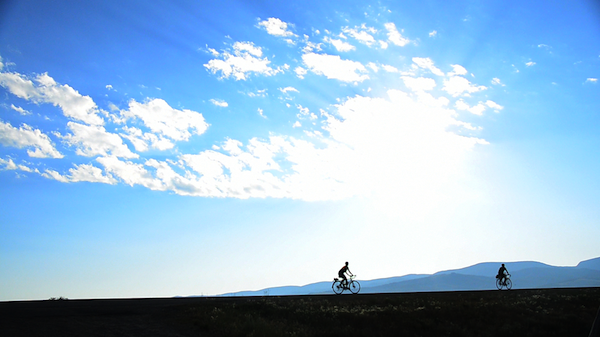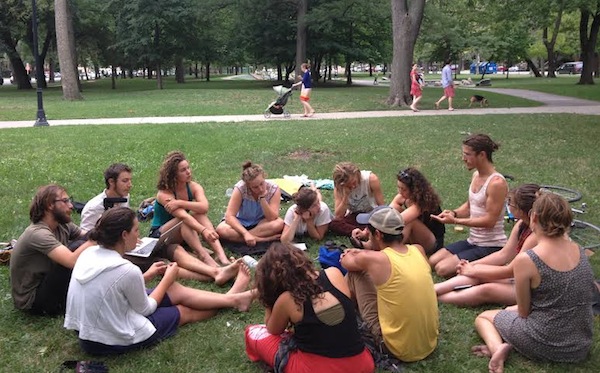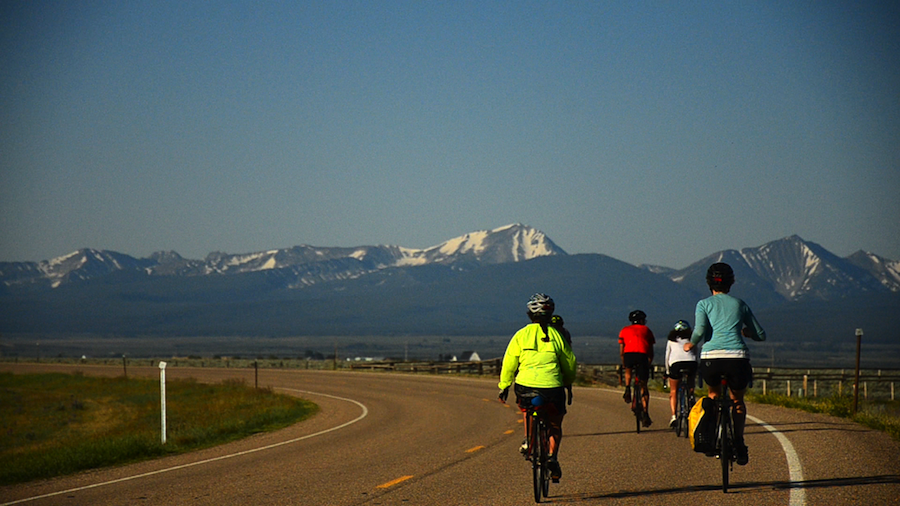In 2012, a group of 18 young people from Hampshire College set off to ride their bikes from San Francisco back home to Amherst, Massachusetts. Dubbed Co-Cycle, the group planned to visit coops along the route to learn from them and create a network of cooperatives. Three months and 15 states later, they arrived safely. Through it all, Emma Thatcher was there documenting the journey for the film To the Moon.
In celebration of Cooperative Month, To the Moon will be screening at many co-ops and community venues across the country this October. You can request a screening of the film at Tugg.
Shareable chatted with Thatcher about the highs and lows of the project, what she and the cyclists learned from the experience, and the importance of trying to better yourself and your community in whatever ways you can.
Shareable: I understand this was your first feature film. Can you give us a little background on yourself and how you came to document Co-Cycle?
Thatcher: My friend from high school, Megan Meo, came to visit me in NYC in 2011 and told me about this cross country co-op cycling project she and her friends at Hampshire College were organizing and it immediately caught my attention. I was a student at NYU’s Tisch School of the Arts at that time and was feeling complacent and immobile in my world view. Talking to her felt like a spark in my life. I was excited to believe in something again and I felt that I was ready to take the leap from the documentary shorts I had been making for nearly a decade and make my first feature film. I met the producer of the film, Anita Gou, during a three month study abroad program in Cuba and we actually started our work on this film from there in Havana. I’m not sure if I really was ready to make my first feature film, but I know I was ready to take a risk, and the lessons this entire process has provided me have been invaluable. I was drawn to the story of youth and self-discovery, of idealistic themes grounded in tangible work, which inspired the title of the film:
“The youth gets together his materials to build a bridge to the moon, or, perchance, a palace or temple on the earth, and, at length, the middle-aged man concludes to build a woodshed with them.” – Henry David Thoreau
In a way, I was searching for some very personal answers, something that would bring me closer to the passion of youth that had once enriched my life so greatly. I set out hoping to capture this spirit, and I believe we did.

Team Co-Cycle
One of the cyclists makes the comment that he’s disillusioned with activism that tries to shake something down and he’s more interested in creating something entirely new. How does this tie in to the Co-Cycle project? What was the vision for the project?
Co-Cycle was initially a concept dreamed up and then created from the ground up by a group of college students who were curious and eager to act on that curiosity. The vision for Co-Cycle, in its simplest form, was to empower cyclists and unite co-ops. The riders propelled their bodies from one place to another in order to listen to the stories of cooperatives—how they started, why they started, how they struggle and how they succeed. As young people, we’ve grown accustomed to protests taking place in the streets and on the internet. However, by stepping out from behind a computer screen and beyond familiar streets, the focus was put on problem solving and gleaning knowledge from those who have experienced so much more than us. Instead of simply saying “this economy doesn’t work”, Co-Cycle was more focused on how to make it better. This is something the cooperative movement has been doing for a very long time. We did a lot of listening during our three months on the road, and that felt like the most radical, productive and important thing to do.
It seems that there was a sentiment shared by several riders that going into Co-Cycle they thought they knew a lot about the world and the country, but that, through the ride, they had many of their assumptions challenged and found that they didn’t know nearly as much as the thought they did. How did this growing awareness inform and impact the ride?
It’s nearly impossible to travel across the country for three months, meeting people, sleeping in a new place every night, and taking in stunning landscape without feeling changed and a little shaken at some point in the process. We heard a lot about the struggles that each community we passed through was facing at the time. The things that we saw working great in Portland weren’t necessarily going to solve the problems that places in North Dakota were facing, places so rooted and dependent on the oil industry. The co-ops started in Northern California with the mission to bring locally grown produce to its community are going to be different from the Chicago co-op providing jobs to immigrant workers who had previously been exploited in their workplace.
It was crucial for us to realize that we don’t have all the answers and that things that work in one city aren’t necessarily going to work in another. Most importantly, we learned to stop assuming. We started asking different questions and we started talking amongst each other differently about the things we were seeing, which is a triumph. In a way the trip was like a testing ground to see how our ideals matched up in the face of some of these harsh realities. This growing awareness added a tangible heaviness and depth to what we were doing and I think you can feel that tonal shift in the film as well.

To the Moon explores the group dynamics of the ride as well as the individual challenges
One of the goals was to connect coops to each other, strengthening the cooperative network. What was the plan for doing this and did everything go according to plan?
The main plan for strengthening the cooperative network was by encouraging cooperatives to work together to plan events as we came through town (cooperation amongst cooperatives). It was a great success. For example, in Stillwater, Minnesota the Atticus Law Cooperative, River Market Food Coop and Northern Vineyards Cooperative Winery all came together to throw an incredible event that reflected each of their efforts. A similar event took place in Viroqua, Wisconsin with about fifteen of their local cooperatives. Our Madison event was also a celebration of MadWorC signing their articles of incorporation with made them a co-op comprised of several cooperatives.
Communities really seized the opportunity to come together and it was incredible to witness. There were no huge hiccups, although we know that in some cities we could have done more to connect with the community, but perfection is not a fair standard considering everything else that was happening (like biking across the continent).
In addition to some great triumphs on the ride, there were also plenty of challenges, from logistics to communication and interpersonal dynamics, traffic, food etc. What were the biggest challenges for you and how did you address them?
The biggest mistake I made in this process was assuming that everyone was on the same page before the trip began. We were scattered between states and I was in a different country, so I just assumed that when I was told “everyone is excited to have you” that everyone really was excited about the film and all that it would entail.
To my surprise, on day one several members started expressing their nervousness with being filmed and I had to figure out how to address that. I really had to put my head where it has never been, in front of the camera—I had to think about how I would feel with a camera in my face for three months. It was really emotionally charged and I think we were all feeling really vulnerable; you can feel this tension in the scene in the tent when we were asked to turn the camera off. The tension finally resolved during a group meeting I called for while in the Columbia River Gorge. I talked openly about the vision of the film, I talked about how this process works and why it’s important to film some of the more difficult moments we encounter—it’s important to show the growth and that must include the struggle. From that point on there was never an issue. Communication is everything. I’m so grateful to my crew, especially the cinematographer of the film, Engin, who came to be so adored by all and made everyone feel so much more comfortable being in front of the camera.
It was also just so draining to be surrounded by my film subjects at all hours of the day—we were essentially working for three months straight. This was hard to navigate as a crew and we had a lot of conversations about it but we really just had to follow our gut and figure things out as we went. I was constantly thinking ahead to the edit room, “Will we need this? Should we be filming?” so I wasn’t totally present for a lot of the experience. I was also cataloging and taking notes on all of the footage throughout the summer, conducting interviews with all of the riders and shooting a second camera. I was pretty on edge for most of the summer to be honest, I was really nervous. Today I’m so grateful for how everything happened, it would have been a disaster to go through that without learning anything. Mostly I learned to trust myself.

The cyclists rode 70 miles per day, making it across the country in three months
In perhaps the most poignant moment of the film, a woman in Chicago challenges the riders by asking them what they’re contributing to the coops they’re visiting. Was that as striking a moment to the riders and the crew as it is to viewers? How did the riders respond?
It was definitely a striking moment for all of us. At that point in the ride we were at an all-time low emotionally. We had been on the road for so long and exhaustion had set in and so to have someone almost question the validity of everything we were doing was tough. But I think that’s exactly what we needed to hear at the time, I think it brought out a more serious and heavy side of everyone.
Post-Chicago definitely became a time of reflection, a time to consider what we were doing and why. This journey may have started from a place of idealism and genuine curiosity, but we soon learned that it wasn’t as simple as finding answers but instead contemplating the right questions. We probably ended the trip with more questions than we started, but that’s a very valuable position for young people to be in. It’s important to be challenged like that.
One rider comments that Co-Cycle is not a solution, but an experiment. Looking at Co-Cycle in that light, what were the results of the experiment? What was learned? What were some of the big picture takeaways from it?
That is a tough question because I think everyone would answer it a little differently. We had a lot of realizations about how to make a bike tour like this function better in terms of simple logistics, but for a first time run of project of this massive scale I think that’s only natural.
It was a social experiment in a lot of ways for us as a group: How do we support each other and ourselves? How do we make the best decisions we can under intensive conditions? What are we willing and able to bring to the group? It was a lot of personal and communicative work for sure. I think one of the biggest takeaways was how we approach and qualify success. Is our trip a success if there are days we can’t stand talking to one another? Is a cooperative a success if it is unable to meet the needs of the entire community? If we aren’t bringing tangible support to the communities we visit, how worthwhile is what we are doing?
What I can conclude is that any attempt to better oneself or ones community, however imperfect it may be, is so incredibly worthwhile. What Co-Cycle represents is so radically different than the status quo of our generation. We consume and function societally at such a high speed, hyper edited pace—and were doing the exact opposite. We were forcing ourselves to consume and listen to everything, and we saw about 70 miles of this country every day. We were slowing everything down to see it more fully. If nothing else I hope the big picture takeaway from this is how truly awesome that is.

Taking in the view
As a viewer, I think the most powerful thing in the film is the transformation that takes place in the riders. It seemed to be a very humbling, realistic glimpse into the gritty, complex, post-college world. Was this your experience? What kind of transformations did you see and experience yourself?
Yes, that was absolutely all of our experience. We met so many inspiring professionals on our journey and that was a very important positive influence and it made us think about what kind of members of society we wanted to be. It was also pretty clear that everyone on the trip was becoming a little more jaded, but not in a bad way. We are absolutely wiser because of the experience we had on the tour and much more privy to knowing what is worth challenging and fighting for. Life after college is equally confusing and scary as some of those nights when we didn’t know where we were going to be sleeping or feeling so fragile while biking next to a semi-truck. Everything on the tour was unexpected and confusing and we had to learn how to fix it. Real life is really no different; communication and cooperation are key factors in all of it.

The ride was a crash course in group process
The riders were so young and seemingly inexperienced in group processes, which becomes painfully clear in the film with the documentation of a six hour meeting. I found myself thinking that Co-Cycle was trying to reinvent the wheel, not taking into consideration the many tools and approaches to group process that already exist. Is this an accurate observation?
It was definitely a crash course in group processes for some of us, but we were following a consensus decision making model so no, we were not trying to reinvent the wheel. That being said, the process was definitely a mess at times and that six hour meeting was not a proud moment for any of us. But I think it’s important to take into consideration the circumstances these meetings were being conducted under. In that particular meeting we had a lot of problems to address and we had a lot of people who weren’t able to get on the same page. This was definitely our lowest point of the entire tour—we were beyond exhausted, overextend and very anxious going into the metropolis of Chicago. That meeting is still painful to watch, but I’m impressed by how everyone just pushed themselves and got through it. Nothing on the road was ideal, which made these processes almost excoriating at times, but we never gave up on the process.
In the end, do you think Co-Cycle strengthened the participants’ belief in the group process and democratic management? How did it affect how you think about these things?
Although it looks at times like we were completely miserable in the process, I think all of us knew that there was no better way we could have approached managing the tour. I think what surprised me most about being part of consensus decision making was how good I felt at the end of every meeting. In other work environments with a top-down structure there is a feeling of helplessness when decisions are made without everyones input, especially if they are bad decisions. With consensus decision making, I felt like I could voice any concern I had with any idea that was proposed. Even when it was challenging, I felt so secure in the process and I was constantly amazed by how much a group of minds working together could accomplish. It’s really hard work to listen and be present and engaged and care, but it’s the good kind of hard work. We all felt that way at the end and it changed the way we communicate even in our interpersonal relationships.
Anything you’d like to add?
Thank you for these questions! Shareable has been such an amazing support for us for so many years now and we are so grateful to be part of the community. We hope that our journey inspires more young people to explore different ways of living and working together.
##
Follow @CatJohnson on Twitter









